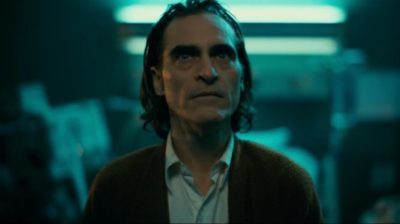Joker reimagines the iconic Batman villain as a mentally ill, impoverished standup comedian.
One-sentence review: Joker is well-made and full of interesting choices that all feel hollow when you consider what the movie is trying to say — the answer: not much.
Details: ? Todd Phillips // ?? U.S. // ⏳ 122 minutes
The cast: Joaquin Phoenix, Robert DeNiro, Zazie Beetz, Frances Conroy
Where to watch Joker: Now playing in theaters.

Joker is not a comic book movie. That's not where it draws its inspirations from. Sure, The Joker is a comic book villain — maybe THE comic book villain — living in the fictional city of Gotham. However, director Todd Phillips is trying to emulate Martin Scorsese more than he is any version of a comic book movie we've seen before. Even Christopher Nolan's darker and grittier Dark Knight series has nothing on Joker. But that's part of the problem.
Arthur Fleck (Joaquin Phoenix) can't catch a break. He's a clown for hire that has to deal with bullying everywhere he goes. In the opening scene, he's jumped by a group of kids who beat him in an alleyway. Even in the locker room where he's surrounded by other clowns he's bullied. A lot of it comes from the fact that he's mentally ill. Unfortunately, his actual condition is never discussed other than his inability to control his laughter, which often comes at inappropriate times.
However, he has dreams of something greater than just being a clown. Arthur's main goal is to be a standup comedian like his idol late-night talk show host Murray Franklin (Robert De Niro). De Niro's inclusion here is a clear nod to Scorsese's often overlooked 1983 film The King of Comedy, which also followed a celebrity-obsessed comedian trying to emulate his hero.
One day, a co-worker gives Arthur a gun to protect himself from the people that bully him around. That's how he ends up killing a trio of drunk wealthy wall street-types who jump him on the subway. The scene is masterful and full of tension as the lights of the subway flicker on and off as the men taunt Arthur. That killing sparks something in Arthur. Something darker. It also sparks anarchy in the city as the “poor” and “disenfranchised” use the man in clown makeup as their symbol of revolt.
For all the discourse around Joker, I was expecting something truly abhorrent — for better or worse. What I was shocked to find is how little of a bite it has. All the moments of Joker's infamous chaos feel so contrived that even if his actions are chaos for the sake of chaos, they have no impact. I don't even think Phillips is completely sure why Arthur is the way he is. He's not an incel or a misunderstood mentally ill person. He's a character that someone thought would be cool.

It's that juvenile perspective that really betrays Joker. What made Christopher Nolan's take on the character so compelling — in addition to Heath Ledger's stellar performance — is he was a mysterious force of evil. Not knowing his motivations made him all the more terrifying. In a way, Joker over explains the character's reasons for being evil to the point that anything and everything he does is unsurprising.
⚠️ Slight spoiler alert.
The great Zazie Beetz appears in the film as a young mother who lives a few doors down from Arthur. The two strike up a friendship despite Arthur's clear oddities that carries throughout the film. In the end, it's revealed that all his interactions with her were imagined. However, I think the movie would have been stronger if the friendship was real and the twist being Beetz's character finding out that Arthur is a danger. It might not be as shocking or subversive, but it would at least ground the Joker in something rather than being a comic book villain in a gritty and realistic world.
I've had such a hard time articulating what I thought about Joker, and that's part of the problem. It's a movie that thinks it's more important, edgier, and more shocking than it is. It's a shame because there are interesting ideas there. The movie needed a director more adept at thinking through those ides.
Hey, I'm Karl, founder and film critic at Smash Cut. I started Smash Cut in 2014 to share my love of movies and give a perspective I haven't yet seen represented. I'm also an editor at The New York Times, a Rotten Tomatoes-approved critic, and a member of the Online Film Critics Society.
Well, it seems like you let preconceptions completely ruin your ability to write a non-terrible review of a movie that even you labeled as “masterful” in the tense moments, but say it missed the mark in those moments only sentences later. Stop trying to “out edge” the movie by thinking you were too smart to like it.
Okay, so the scene with the girl at the end, in her living room, when she tells him to leave, we are supposed to glean from that – that all the interactions between them previous were fantasy?